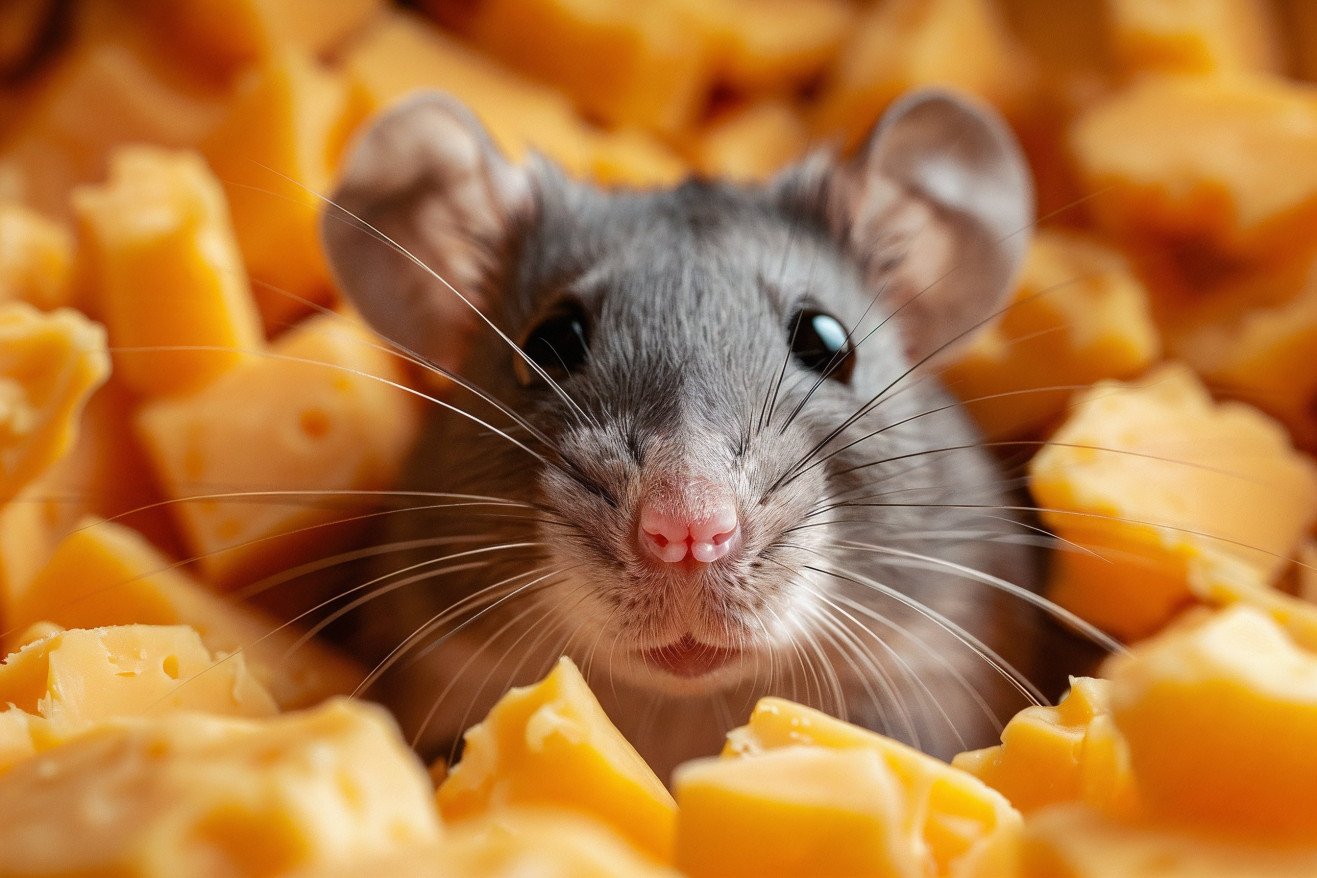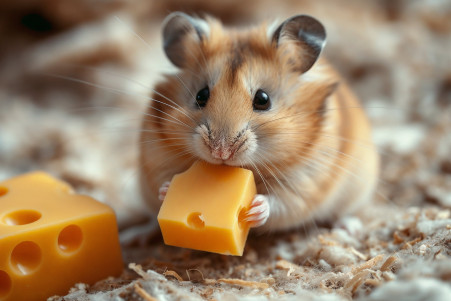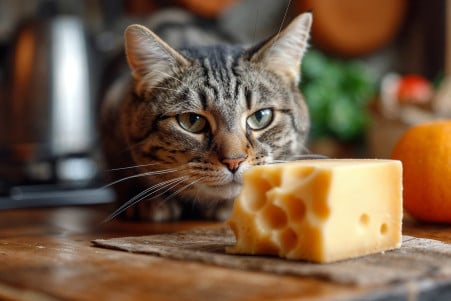Can Rats Have Cheese? The Truth About This Popular Myth
6 April 2024 • Updated 5 April 2024

If you've ever questioned the accuracy of the classic image of rats eating cheese, you're not alone - the truth about rats and cheese is a lot more complicated than you might think. While rats can technically eat cheese, it's best to limit it to an occasional treat because of their lactose intolerance and their tendency to gain weight when they eat fatty foods.
This article will cover a variety of scientific research on rat eating habits, digestive processes, and nutritional requirements. By the end, you'll have a better understanding of what rats can and can't eat while still maintaining a healthy, well-rounded diet whether they're in captivity or the wild. This knowledge is important for both responsible rat owners and pest control professionals to have so that they can make sure these intelligent animals are healthy and well.
Can rats eat cheese?
Rat Nutrition Basics
Rats are omnivores that need to eat a mix of plant and animal foods to get all the nutrients they need. However, not all of these nutrients are created equal. For example, rats need a lot of protein and fat, but they also need a lot of fiber.
The best way to make sure your pet rat is getting everything they need is to start with a high-quality, fortified pellet or rodent block that doesn't contain any artificial preservatives or colors. According to the RSPCA, these pellets should contain between 14-16% protein and 5% fat for adult rats.
In addition to protein and fat, rats need to get a mix of other essential nutrients from their diet. One of the most important of these is fiber, which comes in two forms: soluble and insoluble. Both types of fiber are important for maintaining healthy gut function and gut motility in rats. Rats also need to get a mix of vitamins and minerals from their diet.
While pellets should make up the bulk of a rat's diet, a mix of fresh vegetables, grains, proteins, and a small amount of fruit is also recommended for enrichment. Rats are naturally inquisitive eaters, so introducing new healthy foods into their diet slowly can help keep them mentally stimulated. However, it's important to avoid giving rats high-fat and sugary treats to prevent obesity.
By making sure that you're meeting their specific nutritional needs, you can make sure that your rats are getting all of the nutrients they need to be healthy and happy. This will also help you determine whether or not a specific food like cheese is a good choice for your pet rat.
Best Cheese for Rats
RatCentral suggests that the best cheeses for rats are hard or semi-hard cheeses that have been washed to remove excess whey, which reduces the lactose and fat content. Examples of these cheeses include cheddar, gouda, emmental, and appenzeller. These cheeses are safe for rats to eat in small amounts, but they should be plain with no added ingredients.
On the other hand, Small Pet Select warns against feeding rats soft cheeses like mozzarella, feta, and brie since rats don't have molars and can't properly chew and break down the cheese, which can lead to choking. They also note that some rats may be lactose intolerant, so it's important to watch for any signs of digestive upset when introducing cheese to a rat's diet.
SimplyPets recommends that when feeding cheese to rats, you should only give them a very small amount, usually no more than 1/2 teaspoon per rat. Cheese should be an occasional treat rather than a regular part of a rat's diet since it's high in fat and salt. It's important to use moderation to avoid potential health issues.
Potential Risks of Eating Too Much Cheese
While rats can eat some types of cheese, there are several potential risks associated with eating too much cheese. Exotic Nutrition explains that some cheeses, like blue cheese, contain toxins that can be dangerous for rats, so they should be avoided. Meanwhile, Advice.news warns that the high fat content of cheese can lead to obesity in rats, which is a serious health issue that can lead to heart disease and a shorter life expectancy.
Lactose intolerance is another common issue among rats, as a study in PMC found that adult rats have a low capacity to digest and absorb lactose. Eating cheese, which is high in lactose, can lead to diarrhea and other digestive problems.
In addition to lactose intolerance, the Rat Guide says that rats can develop food allergies or sensitivities to the proteins, fillers, or other ingredients in cheese, which can lead to skin problems, including irritation, inflammation, and hair loss. It's important to watch for any negative reactions when you introduce cheese or any new food to your rat.
It's important for rats to eat a well-rounded, species-appropriate diet in order to be healthy. While some types of cheese can be fed to rats in small amounts on an occasional basis, it's important to avoid overfeeding and watch for signs of intolerance or allergic reactions in your rat.
How to Feed Cheese to a Rat
When feeding cheese to rats, it's important to take a slow and steady approach to avoid neophobia, or fear of new foods. SimplyPets notes that it's also important to watch for any negative reactions when you first introduce cheese to your rat. You should start with very small amounts, such as 1/2 teaspoon or less, and watch for any signs of digestive upset, such as diarrhea.
It's important to feed cheese to rats in moderation. The Rat Shack forum suggests that cheese should be fed as a treat no more than a few times a week because the fat and salt content can lead to health problems, including obesity, if rats eat too much. Instead, you should focus on feeding rats a balanced diet that includes healthier treats, such as fresh vegetables, fruits, grains, and proteins, as recommended by Burgess Pet Care.
In the end, while rats can eat certain cheeses in small amounts, it's best to think of cheese as a supplement to their diet rather than a staple. By focusing on feeding your rat a varied, nutritious diet, you can help ensure that they stay healthy and happy.
Conclusion: Moderation is Key for Rats and Cheese
In conclusion, while rats can eat some types of cheese in moderation as an occasional treat, it's important to remember that a balanced, nutritious diet is more important for these intelligent animals. Cheese should be a small part of a rat's diet because of its high fat content and the potential for lactose intolerance.
Good pet ownership, including watching for negative reactions when introducing new foods, is important for a rat's overall health and well-being. By learning the facts and providing a diverse, stimulating diet, pet owners can leave behind the old stereotype of rats and cheese and focus on the individual needs of these interesting animals.


